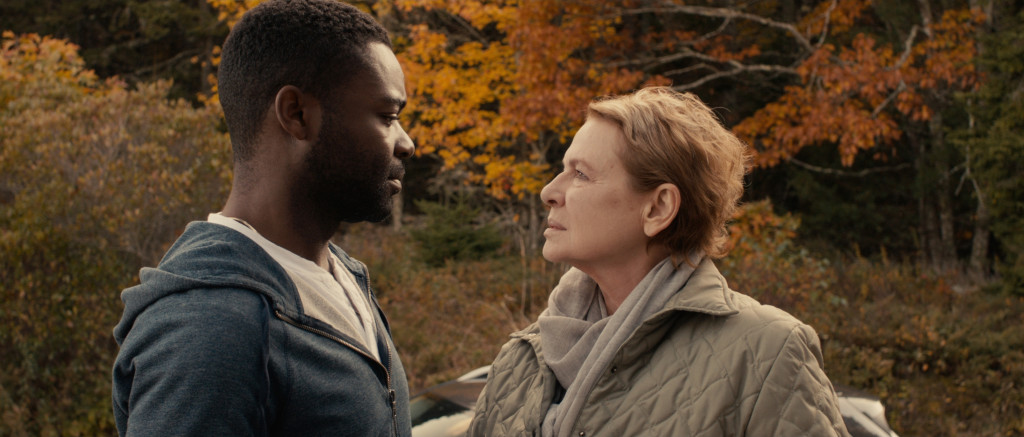
An Atlanta man (David Oyeowlo) suddenly loses his wife to an auto accident and is completely shattered by the depth and the jarring abruptness of his loss. Pushed by his sister out of his paralysis, he drives up to Maine to visit his wife’s mother (Dianne Wiest). She is a person who is generally harsh, judgemental and irritating at all times, but is more so now that her own health is failing. His experience with her becomes the antithesis of the comfort and support that one would expect. As she probes and spars with him, the two are each driven to their own catharsis. The end of Five Nights in Maine also comes abruptly, leaving us to reflect on the lessons learned by the leading characters and how their grief is resolved.
Five Nights in Maine uses a handheld camera and LOTS of close-ups. This was a conscious choice by first-time writer-director Maris Curran, who sought a “closing in” effect because “grief is claustrophobic”.
Dianne Wiest’s performance is an awards-worthy tour de force. Flashing fiery looks and shooting piercing remarks from an invariably rigid posture, she commands our attention every moment that she is on-screen. As we would expect, Oyewolo is outstanding, especially in the early scenes where he collapses into shock. Rosie Perez, not as sassy, but every bit as appealing, as usual, is rock solid in the supporting role as the mother’s nurse. As the sister, Tenoyah Parris (Chi-Raq, Dear White People, Mad Men) gives yet another flawless performance.
I saw Five Nights in Maine at the 59th San Francisco International Film Festival (SFIFF), where Director Maris Curran, producer Carly Hugo and actor David Oyelowo appeared at the screening. Curran said she was motivated to write a story about loss as her own marriage was falling apart; when the ground was pulled out from under her, she created a protagonist in that situation.
Aiming for a sensual look for an emotional film, Curran was able to snare Tunisian cinematographer Sofian El Fani, fresh from his exquisite work in from Blue Is the Warmest Color, for his first American film. Budgeted for a 19-day shoot, the crew finished in only 18.
Oyewolo, happily married for 18 years, found exploring the territory of losing his wife to be very uncomfortable. Five Nights in Maine was shot right after Selma, so his exhaustion from Selma helped him find this “hollowed-out” character. Oyewolo sees Five Nights in Maine as a fish out of water story – not just geographically but emotionally (a man not used to or prepared for grief). Oyewolo prefers women directors because he “wants to be part of stories that are emotionally challenging”.
Fortunately, Curran leavens this dark-themed story with bits of sharp humor. It’s an emotionally affecting and authentic movie. Five Nights in Maine is available to stream on Amazon Instant, Vudu, Google Play, YouTube and DirecTV.

